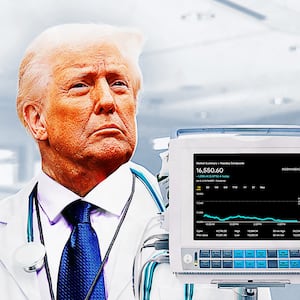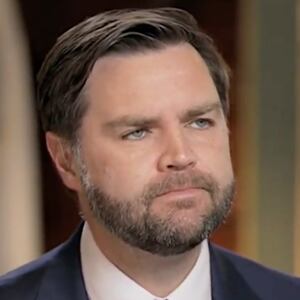The economic fallout from President Donald Trump’s “Liberation Day” tariffs just keeps worsening.
Stock tumbled even further on Friday after the markets had their worst single-day loss since 2020 on Thursday, Bloomberg reported.
The S&P 500, an indicator of the stock market’s overall performance, sank almost 6 percent Friday—its largest decline since March 2020. Another market barometer, the Dow Jones Industrial Average, plummeted more than 2,200 points, or 5.5 percent—its biggest fall since June 2020.
ADVERTISEMENT
Elon Musk’s company, Tesla, was not immune to the stock turmoil, either. The car company’s shares were down 10 percent at Friday’s market close.
Even a better-than-expected jobs report wasn’t enough to buoy the market after China pledged retaliatory tariffs and analysts warned the jobs data was already out of date.
The continued cratering comes after China announced it would impose 34 percent tariffs on American goods starting April 10, matching the tariffs Trump had leveled earlier this week. Shares for Apple, Tesla, and Chinese-owned Alibaba have all dropped multiple percentage points on Friday.
Data released Friday show the U.S. added 228,000 jobs in March, beating forecasts, but the market appeared more focused on the tariff news.
“A good jobs report won’t be enough to quell recession fears because it’s backward-looking and won’t full give insight into how hard the economy will take a hit from the trade war,” Scott Ladner, chief investment officer at Horizon Investments, told Bloomberg.
Meanwhile, Fed Chair Jerome Powell said he expects Trump’s tariffs to raise inflation and lower growth. He said the Fed would keep interest rates on hold given the economic outlook remains “highly uncertain.”
“We are well-positioned to wait for greater clarity before considering any adjustments to our policy stance. It is too soon to say what will be the appropriate path for monetary policy,” he said.
Stocks in Europe were also down about 1 percent on opening, with bank stocks among the hardest hit as investors worry about slowing economic growth, The New York Times reported.
Asian markets fell as well on Thursday, but U.S. stocks took by far the biggest beating.
The president announced a baseline import tax of 10 percent on products from every country in the world late Wednesday afternoon—which, in an Orwellian twist, he deemed “Liberation Day”—then hit products from about 60 countries with additional duties ranging from 20 percent to 49 percent. Companies in the United States will pay the tax, with the costs typically passed along to the consumer.
“The market is giving big thumbs-down to this tariff policy,” Yardeni Research president Ed Yardeni told Bloomberg TV. “I hope the message that the stock market is sending to the administration is being heard.”
The administration, however, is doing its best to downplay the economic pain.
After plunging U.S. stocks erased $3 trillion in collective value, Trump compared the U.S. economy to a “patient that was very sick” that had to be operated on and is now on the path to healing.
In that case, the patient’s vital signs are looking awfully weak.
Analysts at JPMorgan now say there’s a 60 percent chance of global recession this year—up from a 40 percent chance the day the tariffs were announced, the Wall Street Journal reported.
Already, months of Trump’s erratic tariff policy had caused the stock market to fall, consumer confidence to drop and investors to express alarm.
Following Thursday’s market nosedive, Vice President JD Vance said it was just “one bad day” and predicted that, before long, the markets would be booming again.
The administration is apparently hoping the tariffs will be temporary, as Trump has said he’s open to reducing them if other nations offer something “phenomenal.”
Major trading partners—including China and the European Union—have, however, pledged to retaliate.
“We are already finalizing the first package of countermeasures in response to tariffs on steel, and we are now preparing for further countermeasures to protect our interests and our businesses if negotiations fail,” European Commission President Ursula von der Leyen said Thursday.
Trump, meanwhile, spent Friday on the golf course.







